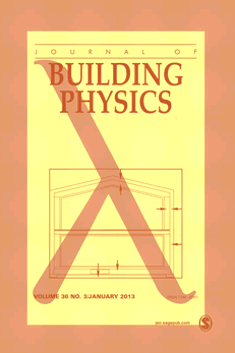
Journal of Building Physics
Scope & Guideline
Shaping the Future of Building Physics Research
Introduction
Aims and Scopes
- Energy Efficiency in Buildings:
The journal emphasizes research aimed at improving energy efficiency in building designs, including studies on insulation materials, thermal performance, and renewable energy integration. - Hygrothermal Behavior of Building Materials:
A core focus is on the hygrothermal performance of various building materials, investigating moisture transfer, thermal dynamics, and the impact of climate conditions on material behavior. - Indoor Air Quality and Comfort:
Research addressing the indoor environmental quality, including air flow, thermal comfort, and the effects of building design on occupant health and well-being, is a significant part of the journal's scope. - Sustainable Building Practices:
The journal promotes the exploration of sustainable building practices, evaluating eco-friendly materials, green roofs, and passive design strategies that contribute to reduced environmental impact. - Computational and Experimental Modeling:
The use of computational methods, such as CFD simulations and machine learning, alongside experimental validation, is a hallmark of the research published, facilitating the design and optimization of building systems.
Trending and Emerging
- Smart Building Technologies:
The integration of smart technologies and IoT (Internet of Things) in building design and operation is gaining traction, emphasizing real-time monitoring and adaptive systems for energy management. - Climate-Responsive Design:
Research focusing on climate-responsive building design is on the rise, exploring how structures can adapt to varying environmental conditions to enhance energy efficiency and occupant comfort. - Bio-based and Recycled Materials:
An increasing number of studies are investigating the use of bio-based and recycled building materials, aligning with sustainability goals and the circular economy. - Machine Learning and Data-Driven Approaches:
The application of machine learning and data-driven methodologies for predicting building performance and optimizing designs is becoming prevalent, reflecting advancements in computational capabilities. - Multi-Objective Optimization Techniques:
Research utilizing multi-objective optimization techniques to balance energy efficiency, cost, and comfort in building designs is trending, highlighting the complexity of modern building systems.
Declining or Waning
- Traditional Construction Materials:
Research focused solely on traditional construction materials without considering innovative alternatives or sustainable practices has decreased, as the field trends towards more eco-friendly materials. - Basic Thermal Properties without Contextual Analysis:
Studies that only present basic thermal properties of materials without contextual analysis related to building performance or environmental conditions are less frequently published. - Historical Building Performance Analysis:
The analysis of historical building performance, while still relevant, has seen a decline as the journal increasingly features studies on modern building technologies and sustainability practices. - Single-Factor Studies:
Research that examines single factors in isolation, such as temperature or moisture without integrating multiple variables or a holistic approach, is becoming less common, reflecting a trend toward more complex, multifaceted investigations. - Low-Tech Solutions:
The focus on low-tech, non-innovative solutions for building physics challenges is waning, as there is a growing interest in high-tech, integrated systems that leverage advanced technology for performance improvements.
Similar Journals

BUILDING ACOUSTICS
Transforming Spaces with Acoustic IntelligenceBuilding Acoustics, published by SAGE Publications Inc, is a distinguished journal that serves as a critical resource in the fields of acoustics, building construction, and mechanical engineering. With an ISSN of 1351-010X and an E-ISSN of 2059-8025, this journal has maintained a strong reputation since its inception in 1997, featuring rigorous peer-reviewed research that provides valuable insights into the acoustic properties of buildings and environments. With a commendable Q2 ranking in its categories and a notable standing within the Scopus Ranks, this journal plays a pivotal role in advancing knowledge and practice in its field. Researchers, professionals, and students are invited to engage with cutting-edge studies that address crucial aspects of sound control, environmental noise, and sustainable architectural design. Although not an Open Access journal, Building Acoustics ensures accessibility through various institutional affiliations and library provisions, solidifying its position as an essential publication for those dedicated to enhancing the acoustic performance of built environments.
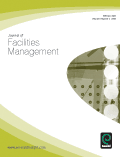
Journal of Facilities Management
Empowering Insights for Effective Facilities ManagementThe Journal of Facilities Management, published by Emerald Group Publishing Ltd, is a premier scholarly platform dedicated to the evolving field of facilities management. With an ISSN of 1472-5967 and an E-ISSN of 1741-0983, this journal has established itself as a crucial resource for researchers, practitioners, and students alike since its inception. Operating within a robust academic framework, the journal holds a commendable Q2 ranking in various pertinent categories including Business and International Management, Management of Technology and Innovation, and Strategy and Management, reflecting its impact and relevance in these domains. The journal invites high-quality, interdisciplinary research that addresses the complexities of facilities management, providing insights and practical solutions that benefit organizations worldwide. Although not open access, the Journal is committed to maintaining academic rigor and accessible knowledge dissemination through its articles, which are meticulously reviewed by experts in the field. As it continues to evolve through its converged publication years of 2002 to 2003 and 2005 to 2024, the Journal of Facilities Management stands out as an essential resource for those seeking to enhance their understanding and practice of effective facilities management.

Archives of Thermodynamics
Innovating Insights into Thermodynamic ProcessesArchives of Thermodynamics is a reputable journal dedicated to the field of thermodynamics, published by the esteemed POLISH ACADEMY OF SCIENCES. With a robust history since its inception in 2003, this journal serves as a critical platform for disseminating high-quality research aimed at advancing knowledge and technology in thermodynamic systems and processes. Recognized for its contribution to the field, it holds a Q3 ranking in the Physics and Astronomy (miscellaneous) category as of 2023, with a respectable Scopus rank of #148 out of 243, placing it within the 39th percentile. Although it follows a traditional access model, the journal's commitment to scholarly excellence ensures that researchers, professionals, and students alike can benefit from its rich archives and ongoing discussions within the scientific community. Situated in Warsaw, Poland, the journal not only reflects a regional dedication to scientific progress, but also engages with global audiences interested in the evolving landscape of thermodynamic research.
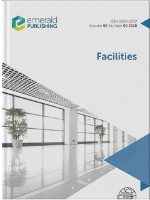
Facilities
Advancing knowledge at the intersection of architecture and human experience.Facilities is an esteemed international journal, published by Emerald Group Publishing Ltd, dedicated to advancing the scholarly discourse in the multifaceted areas of architecture, building construction, and human factors and ergonomics. Since its inception in 1983, the journal has celebrated over four decades of research contributions, maintaining a robust E-ISSN of 1758-7131 while its print identifier is ISSN 0263-2772. With its distinguished status, it ranks in the Q1 quartile in Architecture and is positioned in the Q2 quartile for both Building and Construction and Human Factors and Ergonomics in 2023. The journal’s Scopus rankings highlight its relevance, achieving a remarkable 88th percentile in Architecture and 68th percentile in Building and Construction. Although not an Open Access publication, Facilities provides vital insights and research findings that cater to academics, practitioners, and students alike, fostering innovation and informed practices across these dynamic fields. Its commitment to high-quality scholarship makes it an indispensable resource for anyone engaged in improving the interaction between people and the built environment.
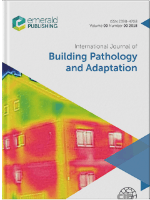
International Journal of Building Pathology and Adaptation
Elevating the standards of building pathology and adaptation.International Journal of Building Pathology and Adaptation is a premier publication dedicated to advancing knowledge in the field of building pathology and adaptation. Established by the esteemed Emerald Group Publishing Ltd, this journal serves as a vital platform for researchers and practitioners focusing on the assessment, preservation, and innovative adaptation of built environments. With an impressive Q2 ranking in both Building and Construction and Civil and Structural Engineering, and a Scopus ranking of #62 out of 223 in the relevant engineering disciplines, the journal showcases high-quality research with significant practical implications. Although currently not featuring an open-access model, its access options cater to a wide audience aiming to explore cutting-edge studies from 2017 to 2024. The journal's commitment to bridging the gap between academic inquiry and real-world application makes it an essential resource for anyone dedicated to advancing the resilience and sustainability of the built environment.

Frontiers in Built Environment
Connecting researchers to the forefront of built environment challenges.Frontiers in Built Environment, published by FRONTIERS MEDIA SA, is a highly regarded open-access journal that has established itself as a significant platform for cutting-edge research in the fields of building and construction, geography, planning and development, and urban studies. Since its inception in 2015, this journal has embraced a commitment to disseminating high-quality, peer-reviewed research, allowing researchers, professionals, and students to access pivotal findings and insights without financial barriers. With an impressive 2023 impact factor, it ranks in the Q1 tier for Urban Studies and is positioned within the Q2 tier for both Building and Construction and Geography, Planning and Development, demonstrating its influence and relevance in evolving urban and environmental challenges. Its rigorous indexing, exemplified by a strong Scopus ranking, reflects its contribution to the advancement of knowledge in these critical areas. With a clear dedication to fostering innovation and collaboration within the built environment sector, Frontiers in Built Environment is essential reading for those engaged in shaping sustainable urban futures.

Building Simulation
Fostering Global Dialogue on Building EfficiencyBuilding Simulation is a leading academic journal published by TSINGHUA UNIVERSITY PRESS, focusing on the critical intersection of building and construction and energy efficiency. With its ISSN 1996-3599 and E-ISSN 1996-8744, this journal stands out in the Q1 category for both Building and Construction and Energy (miscellaneous), as recognized in the latest 2023 category quartiles. It has established itself as an influential platform for disseminating innovative research and developments in building performance simulation and energy use optimization, boasting impressive Scopus rankings at Rank #15/223 in Engineering (Building and Construction) and Rank #15/78 in Energy (miscellaneous), placing it in the upper percentiles of its field. Since its inception in 2008, the journal has fostered a rich dialogue among practitioners, researchers, and students, empowering them to advance sustainable building practices and contribute to global energy conservation efforts. Building Simulation is an open-access journal, making its valuable content accessible to a worldwide audience, further enhancing its role as a vital resource in the quest for innovative building solutions.
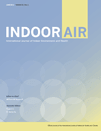
INDOOR AIR
Transforming Spaces, Enhancing Lives.INDOOR AIR is a leading peer-reviewed journal published by WILEY-HINDAWI, focusing on the critical field of indoor environmental quality and its impact on public health. Since its inception in 1991, this esteemed journal has been at the forefront of research in Building and Construction, Environmental Engineering, and Public Health. With a commendable Q1 ranking across these categories in 2023, INDOOR AIR has established itself as a pivotal resource for scholars and industry professionals alike, as evidenced by its impressive Scopus rankings—35th in Public Health, 14th in Building and Construction, and 20th in Environmental Engineering. The journal is dedicated to disseminating groundbreaking research, reviews, and case studies that advance knowledge and methodologies in improving indoor air quality and its implications for health outcomes. Aspiring to maintain open access to vital scientific discourse, INDOOR AIR invites contributions that foster interdisciplinary collaboration and innovation in understanding indoor environments. Based in Denmark, the journal continues to engage a global audience committed to enhancing health and well-being through improved indoor air quality.
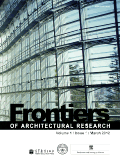
Frontiers of Architectural Research
Cultivating Insightful Research for a Sustainable Built EnvironmentFrontiers of Architectural Research, published by KEAI PUBLISHING LTD, stands at the forefront of interdisciplinary scholarship, addressing contemporary challenges in the fields of architecture, urban studies, building and construction, and archaeology. Since its establishment in 2012, this open-access journal has rapidly gained recognition, achieving prestigious rankings in the 2023 category quartiles, including Q1 placements in both Architecture and Archaeology. With an impressive Scopus rank of #5 out of 354 in Archaeology and #10 out of 189 in Engineering - Architecture, it demonstrates its significant influence and contribution to advancing architectural research. Frontiers of Architectural Research embraces a broad scope that fosters innovative discourse and practical solutions, catering to a diverse audience of researchers, professionals, and students keen on exploring the intersection of culture, environment, and technology. By ensuring immediate access to research findings, the journal not only enhances the visibility of scholarly work but also encourages collaborative dialogues that shape the future of architectural practice.

INDOOR AND BUILT ENVIRONMENT
Elevating Standards for Indoor Environmental QualityINDOOR AND BUILT ENVIRONMENT is a prestigious peer-reviewed journal published by SAGE PUBLICATIONS LTD, focusing on the interdisciplinary fields of indoor environmental quality, human health, and sustainable built environments. With an ISSN of 1420-326X and an E-ISSN of 1423-0070, the journal has been a significant contributor to research and knowledge dissemination since its inception in 1992, continuing through to 2024. Positioned in the Q2 category of public health, it ranks impressively at #122 out of 665 in the Scopus metrics for Medicine, showcasing its influence and relevance in the field with an 81st percentile standing. While the journal does not currently offer open access options, it remains a vital resource for researchers, professionals, and students eager to explore the critical interplay between indoor environments and public health. With its comprehensive coverage and a commitment to high-quality research, INDOOR AND BUILT ENVIRONMENT plays an essential role in advancing knowledge and practices that contribute to healthier living and working spaces.